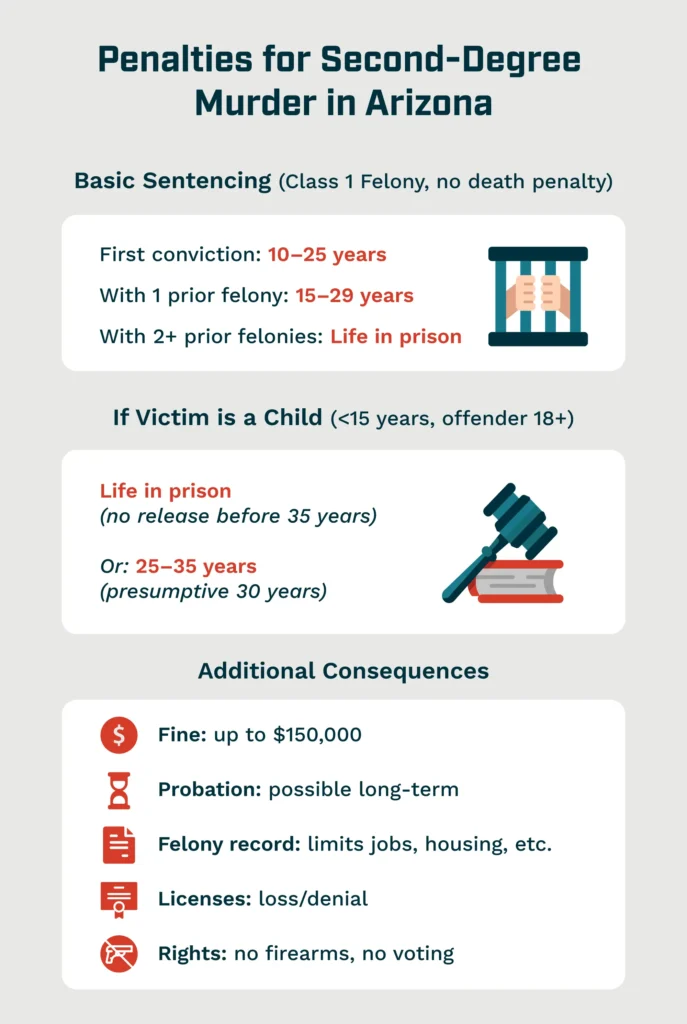
Posted on September 18, 2025 in Assault & Violent Crimes
Arizona law defines second‑degree murder (without premeditation) to include intentionally causing death, knowingly engaging in conduct that will cause death or serious physical injury that results in death, or—under circumstances showing extreme indifference to human life—recklessly engaging in conduct that creates a grave risk of death and thereby causes death.
A conviction of second-degree murder in Arizona is a Class 1 felony, the most severe level of felony under state law. So, if you are facing a second-degree murder charge, having effective legal counsel is essential.AZ Defenders represents clients charged with all kinds of homicide in Arizona, including second-degree murder. If you or a loved one has been charged with second-degree murder, then call us at (480) 456-6400 to speak with a criminal defense attorney in a free initial consultation.
The Arizona law that defines second-degree murder is Arizona Revised Statute (ARS) 13-1104. This statute identifies the following offenses:
To fully understand how ARS 13-1104 works, we need to understand some of its key terms.
The key distinction between second-degree and first-degree murder is that second-degree murder does not involve premeditation.
Premeditation means contemplating or planning the act of murder in advance. This reflection or planning can happen in an interval of even a few seconds, increasing what would be a second-degree murder charge to first-degree.
To act intentionally in causing the death of another person is to act with the objective to kill that person.
To knowingly engage in conduct that causes serious injury or death to another person means that you are aware, or believe, that what you are doing will lead to that outcome. In the context of second-degree murder, knowing behavior means that a person knows his or her conduct will cause death or serious physical injury, and death results.
Think of extreme indifference to human life as a form of extreme recklessness to a risk of grave danger or circumstance that reflects an utter disregard for human life to the point where the death of another person becomes reasonably foreseeable if not inevitable. This is more than ordinary recklessness, which is the foundation for a manslaughter charge or criminal negligence.
The crime of manslaughter in Arizona includes committing second-degree murder based on a sudden quarrel or heat of passion, or if you were under coercion at the time. These extenuating circumstances are less than the knowing or intentional conduct ordinarily required in a second-degree murder charge.

Generally a conviction of second-degree murder is a Class 1 felony that does not include the possibility of a death sentence.
For a first-time conviction, you could face a state prison sentence of at least 10 years, with a presumptive sentence of 16 years and a maximum of 25 years.
If you have a prior conviction for second-degree murder, or for a Class 2 or Class 3 felony dangerous offense, then the sentencing range increases to:
If you have prior convictions for two or more serious offenses, then the sentence is life in prison with no eligibility for suspension of sentence, probation, pardon or release from confinement on any basis, except under limited circumstances like medical treatment, participation in medical research or compassionate leave, until you have served 25 years or the sentence is commuted.
If you are 18 or older and the second-degree murder charge is a dangerous crime against a child victim less than 15 years old, then enhanced penalties apply:
A term in prison is only the beginning of the trouble you could face after a second-degree murder conviction. For example, any felony conviction in Arizona can include a fine of up to $150,000 and possibly millions in restitution.
In addition, any felony conviction in Arizona can negatively affect other aspects of your life even after you complete any prison term and pay all your fines.
For example:
Possible defenses to a second-degree murder charge depend on the facts of your case. We cover some of the more common defenses below.
ARS 13-1104 exempts the following people from its coverage:
Sometimes you may need to use deadly physical force to protect yourself or others from another person who is using or threatening to use deadly force against you or someone else. And sometimes you have very little time to think about the need to use deadly force in such a situation.
Using deadly force to defend yourself or others is justifiable if a reasonable person in the same situation would have believed that its immediate use was necessary in response to an imminent threat of serious physical injury or death at the hands of another person. It is not necessary that such a danger actually existed, as long as the belief that it existed was reasonable.
In a manner similar to self-defense, in some specific situations, you can use deadly force to prevent the commission of a serious criminal act. Examples of such crimes that you could resort to deadly force to prevent include:
Second-degree murder requires you to knowingly or intentionally cause the death of another person, or to exhibit an extreme disregard for human life. So, if you can show that your conduct did not rise to this level, then you may be able to avoid the conviction. You may still, however, be subject to a lesser homicide charge, like a manslaughter or negligent homicide charge.
Similarly, if the murder was committed because of a sudden quarrel or heat of passion, then you may be able to plea bargain down to the less serious offense of manslaughter.
Another possible defense can be if a third person was the actual reason for the death.
For example, if you seriously injure another person in self-defense, and that person later dies, but the actual cause of the other person’s death was a medical error, then you might be able break the causation link needed to convict you of second-degree murder because someone else was responsible for the death itself.
This is a common defense that can apply to every homicide charge.
To convict you of second-degree murder, the prosecution must prove every element of its case beyond a reasonable doubt with material evidence. The more you can cast reasonable doubt on that evidence, the weaker the prosecution’s case against you becomes.
Some examples of how you can attack the prosecution’s evidence include:
As with all other criminal charges, in a murder charge and prosecution, police and prosecutors must follow proper procedures. If they fail to do so, in some cases it can lead to dismissal of the charge(s) against you.
Procedural defenses include:
Short of first-degree murder, second-degree murder is the most serious criminal homicide charge you can face. As we have seen above, if you get convicted of this offense, you could spend decades in prison, if not the rest of your life.
Therefore, if you have been charged with second-degree murder in Arizona, then you need the best possible legal representation from an experienced criminal defense lawyer. That is what you will have when you retain AZ Defenders.
Our Arizona criminal defense attorneys have more than 100 years of combined legal experience and have successfully represented thousands of clients, including clients charged with violent crimes like murder. Many of our attorneys are former state, county, and city prosecutors. who have successfully represented people in homicide cases.Call us at (480) 456-6400 at any time to speak with one of our law firm’s criminal defense specialists and to schedule a free initial consultation. You can also arrange a free consultation by using our online contact form.